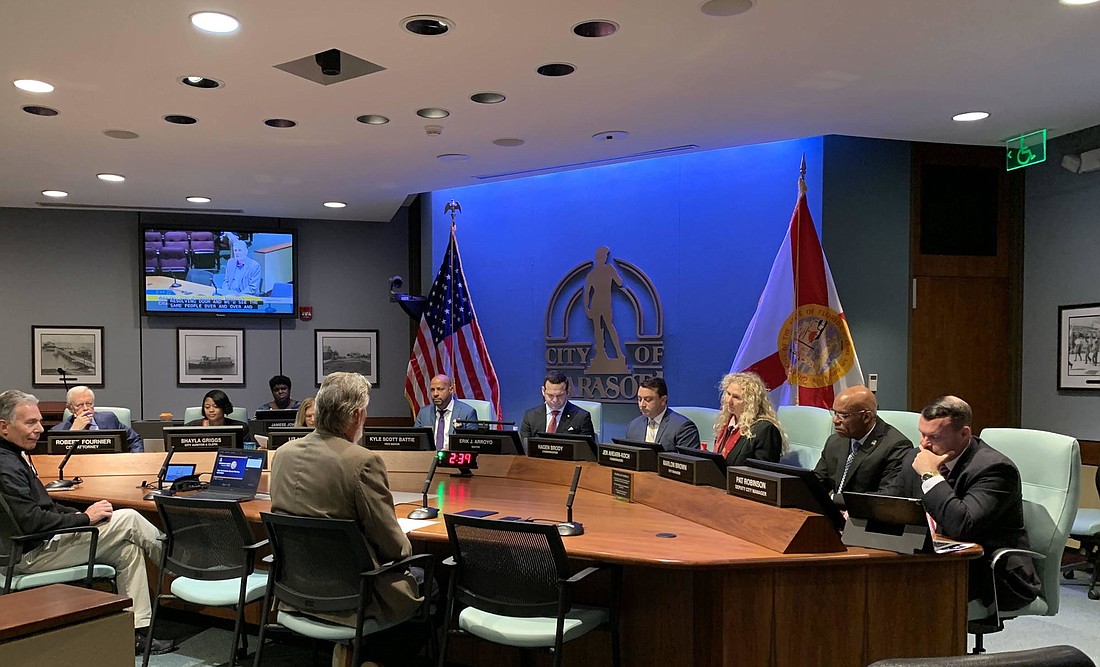- July 26, 2024
-
-
Loading

Loading

Sarasota's form of city government will remain as is for now after commissioners on Monday for ballot placement a charter-revision proposal that would have created an elected mayor's position.
The 4-1 vote in a special meeting organized to consider proposals from the city's Charter Review Commission didn't outright reject the notion but rather voted against the possibility of a voter referendum on the subject in November. The rejected proposal called for a mayor who would be elected citywide every four years, the elimination of at-large commission seats and a new city commission map with four districts instead of three.
The elected mayor would have been vested with no additional powers than the other four district-elected commissioners, and the responsibilities and roles of the city's charter staff — city manager, city clerk/auditor and city attorney — would have remained unchanged.
“I believe this is not the way to handle it,'' said Commissioner Liz Alpert, who voted in the majority. "I'm not in favor of this recommendation at all. I think the way we have it now works very well.”
Among the charter revision recommendations the commission did approve for the November ballot:
The city, like many with a commission-manager form of government, operates with elected officials supported by a professional staff. The mayor in Sarasota, and in many other cities, is more of a ceremonial role though the member in that role has the responsibility of running public meetings. Mayors in such forms of government are selected by their elected-member colleagues.
Mayor Erik Arroyo, who was selected to his seat for a year's term in November, cast the dissenting vote. He said the city probably should at some point consider a stronger form of mayor who can serve for a number of years and be elected with a vision to pursue.
He added that the role of City Manager Marlon Brown is often limited, and that an executive-style mayor could not only initiate policy actions, but also help to get them passed.
"What's presented to us, I agree we probably shouldn’t adopt,'' he said. "I think the strongest argument we have is Mr. Brown can't come to us and say, 'I would like you to pass this.' If we had someone who is sort of at the same level as Mr. Brown and was adept at driving policy. … There may be some benefits to it.’’
Commissioner Hagen Brody said he would also support future discussion of an executive-style mayor in the future but made clear Monday's discussions shouldn't be construed as criticism of individual staff members in City Hall. "I adore our charter officials we have today,'' he said.
"Are we ready for it now? My feeling is that the only body that can answer that is the electorate,'' Brody said. "Eventually, I think somebody is going to have to craft an executive-mayor form of government and ask that question, and if we're not ready now, we're not ready. But at some point in the future, either a group of citizens is going to have to put that together and get the petitions to do it, or the commission is going to have to do it.
The city is obligated to convene a Charter Review Committee every 10 years, with each commissioner tapping two individuals to serve on the 10-member advisory board. This board began work last summer and one of its main focuses was the role of mayor.
The city has seen multiple failed attempts to create an elected mayor position. In 2011, the Charter Review Committee decided not to recommend such a referendum after three previous measures did not garner support from a majority of voters.
Resident Martin Hyde told commissioners a switch to a citywide election for mayor would likely doom the chances of a minority winning the seat in what he called "a high-dollar race.''
"You know who doesn't win that? An African-American doesn't win that,'' he said.
Vice Mayor Kyle Battie said he was in favor of keeping things as they are. "I like the way our government is functioning,'' he said. "I like the direction of the city and I think we’ve accomplished much in my short time with the city. That’s my position and I stand by it.''
Alpert noted that beyond the change in how mayors would be elected, the switch away from three districts and two at-large seats to four single-member districts and a mayor makes a fundamental change. She reminded commissioners that everyone in the city now has the ability to vote for three of the five seats. Under the proposal, that number falls to two.
"It may be faster with one person driving the ship, it might not be better,'' Commissioner Jen Ahearn-Koch said.